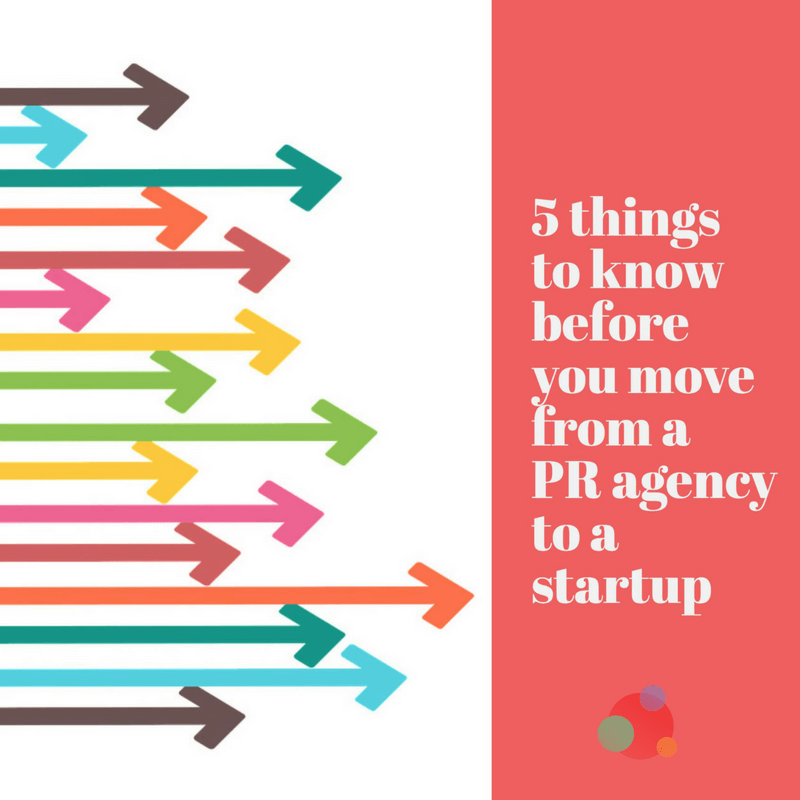 It’s been more than a year since I decided to make a career twist.
It’s been more than a year since I decided to make a career twist.
Moving from a well-respected PR agency to a small startup had never seemed like an option.
I had access to a unique know-how, worked for world-class technology accounts, and spent every day with brilliant teammates.
Three years with H+K Strategies were a school of hard knocks, but I don’t regret a single day.
In December 2015, Joanna from Prowly offered me a position to join their ranks as communication lead.
I decided to take the risk and jump on board.
After a little more than a year, I have a much better vision of how PR in a startup actually looks like.
Here are some key differences you should be aware of before switching from a PR agency to a startup.
Leave Your PR Agency Long-Term Action Plans at Home
From quarterly to annual, you’ve probably got used to your PR agency’s exhausting planning sessions and strategy presentations.
Even though they required a lot of work, I loved them.
Having a long-term communication plan works well with a client who gives you an overview of what the next six months should look like.
Whatever happens, having an action plan is a comfortable situation.
Well, not anymore.
Most startups can’t afford this comfort.
This is a completely different world where every single day matters.
If something didn’t work today, chances are it won’t work tomorrow and you should try something different instead.
Spend a day with the founders, talk to the team, do your research.
Find out what’s the story behind your startup.
Make sure you understand the unique selling point.
Then, construct a narrative around which you’ll build all your further actions.
Just make sure it’s flexible enough for various target groups, channels, and messages, as these may change or develop over time.
Then communicate, analyze, and measure.
Measurement and Analytics are Your New Best Friends
Continuous measurement is the key.
While PR still debates about its importance and looks for proper metrics (in 2016, 65 percent of consultancies surveyed by AMEC believed measurement will become a fundamental part of every PR program), startups already measure whatever can be measured.
It’s that simple—if you don’t know the results, you can’t say if it did or didn’t work.
And if your company and/or clients are paying you and you can’t say if you’ve succeeded or not, their business is not developing as rapidly as it should.
Sorry folks, but that sounds like losing money.
We’re in a much better situation than our colleagues 10, 20, or 40 years ago.
The shift to digital marketing made it simple.
Thanks to the internet, augmented reality, big data, social media, and smartphones, PR can now do more than ever before and track the results.
If you work at a startup and can’t decide between a measurable and a non-measurable tactic, go for the former, even if your gut is telling you the latter could might better (you’d never really know!).
Once you see your ideas worked and drove some decent results, well done!
Now get some budget to support them to maximize the potential.
Just don’t try it over and over again if it was a failure the first time.
Decision-Making Goes from 0 to 100 MPH in One Second
Back in my PR agency days, whenever I wanted to try out a new solution for one of the clients, I had to go through a time-consuming decision-making process before hearing a final go/no go.
That’s reasonable: It’s clients’ right to expect rock solid recommendations, often approved by account leads and backed with basic experience in the area.
Well, startups are a completely different world.
Because it’s all about testing new things to find the ones that perform the best, it usually takes hours, if not minutes, to get that go/no go.
Slack is Good, But Emails are Better
Don’t get yourself dragged into this startup hype around Slack.
It’s a good messaging app and I don’t neglect it, but it also comes with dangerous distractions.
It’s a risky situation when key team members get into a pointless discussion instead of focusing on their current tasks, and it happens very often.
Use your good, old email instead for your most important communications.
It should save you a lot of time (and nerves).
Bonus: Most companies use the free version of Slack which doesn’t archive messages once a certain limit is exceeded.
That way, it’s easy to lose stuff: Valuable links, significant decisions, or entire discussions.
Emails are much more durable.
You’d Better Learn How to SCRUM
In a nutshell, SCRUM is a management and control process that was built for software teams.
However, we’ve tested it in our communications team and it really works.
If implemented properly, it helps team members organize their daily and weekly tasks, track progress, and make necessary improvements, no matter how complex their projects.
It’s also useful for supervisors and managers to find the best approach for any problem or any idea as it makes teamwork much more transparent.
The Transition from a PR Agency to Startup is Fast and Furious, But Fun
Here’s the most important thing: In the midst of all this change, don’t get discouraged.
Things will be happening fast.
And most of the time you won’t be able to follow your strategy from A to Z without any irregularities or last minute 180-degree changes.
Once you get used to it, you’ll start having fun.
At the end, that’s what the game is all about.
Innovations change the world and if you can be a part of that then I guarantee you’ll get a lot of unique, priceless experience.